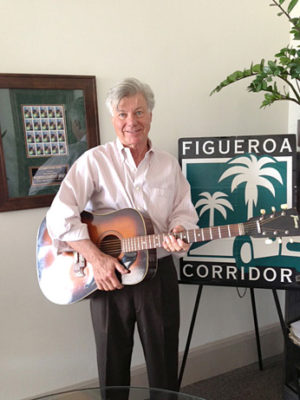Darryl Holter, CEO of Downtown L.A. Motor Group, moonlights as musician

AUTO EXECUTIVE has cut three albums.
Darryl Holter used to teach history. Now he is making it.
He is credited with being the driving force to turn the Figueroa corridor around after the 1992 riots.
When Nick Shammas, his wife Carole’s father, despaired about keeping his dealerships in downtown open after they had been vandalized by rioters, Holter left academia to help rebuild the businesses.
Shammas, who died in 2003 at 87, was a pioneering auto dealer in Los Angeles. He owned a string of showrooms along Figueroa St. south of downtown, starting with the Felix Auto Center he founded in 1955. But after the riots, stores and auto dealerships were boarded up all along Figueroa St., Holter recalled even General Motors wanted to move the flagship store, Felix Chevrolet, to the suburbs.
Holter met with Steve Sample, then president of neighboring USC and James Powell, head of the Los Angeles County Natural History Museum to plan the rebuilding of the area. That’s when the Hancock Park resident established the Figueroa Corridor partnership. The street was cleaned of debris and graffiti, and private security firms were hired to patrol the area to insure its safety.
The turnaround paved the way for investors to put more than $2.5 billion in redevelopment.
To prove his faith in the corridor’s revival, he invested $30 million in an overhaul of the Mercedes-Benz store.
He also built a 1,400-unit apartment building, mainly to house USC students.
Today, he oversees close to 1,000 employees in the Downtown L.A. Auto Group whose dealerships include Audi, Porsche, Felix Chevrolet, Volkswagen, Nissan, Mercedes, Toyota and Scion. He also runs Shammas Holdings with his mother-in-law Jeanette Shammas.
A native of Minnesota, Holter taught European history at the University of Minnesota, and came west to teach at UCLA in 1991.
He shares a Midwest background with Bob Dylan, and has played with Pete Seeger on a few picket lines during his union organizing days. It was his love of the guitar that prompted him to start performing again. Holter has had several gigs on stage at Seven Grand, a downtown bar. He has recorded three albums—almost all featuring songs he wrote. The songs are what he calls his “musical journal from country to folk, protest songs to blues, and finally to whatever it is that I do today.”
The fair-haired, unassuming executive has an encyclopedic knowledge of the history of folksingers that also figures prominently on the liners of his albums. His “double life” has the support of his family. Carole has retired from USC where she was chairman of the history department. Daughter Julia is an acclaimed singer-songwriter who also plays the harpsichord and drums. Daughter Rachel owns a public relations firm.
In the “Darryl Holter” album notes, a friend describes Holter as “having lived many lives—as an enlightened academic, imaginative entrepreneur, urban revitalizer and compassionate manager of businesses and people.”
He is a man for all seasons.
Category: People


